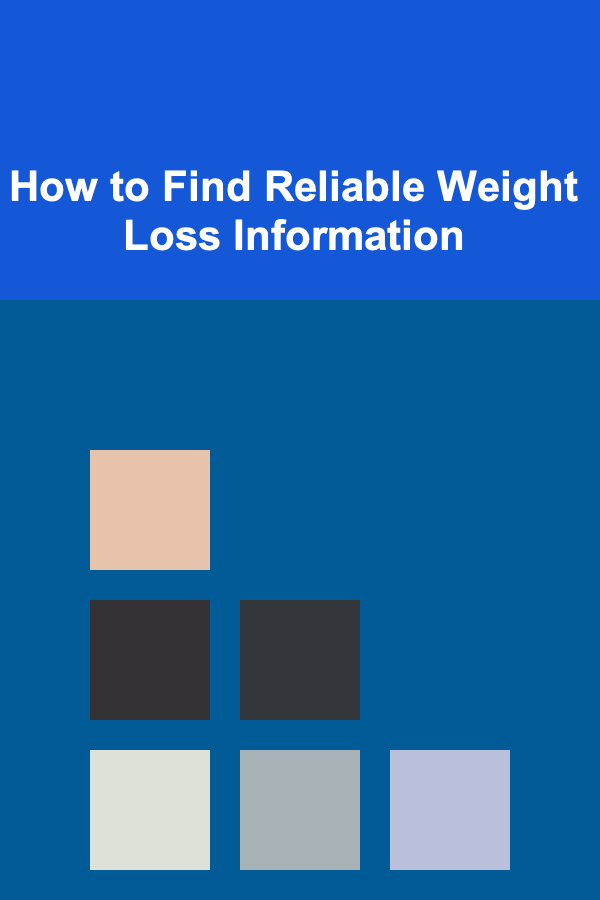
How to Find Reliable Weight Loss Information
ebook include PDF & Audio bundle (Micro Guide)
$12.99$8.99
Limited Time Offer! Order within the next:

In today's age of instant information and social media, finding reliable weight loss information can be overwhelming. With countless diet plans, exercise routines, and health myths circulating online, it's easy to feel confused or misled. Whether you're looking to lose weight for health reasons, improve your fitness, or feel more confident in your body, it's crucial to navigate the vast sea of information carefully.
This article aims to guide you through the process of identifying trustworthy sources, avoiding misinformation, and understanding how to make informed decisions about weight loss. The ability to discern credible advice from unreliable claims is a skill that can significantly impact your health and overall well-being.
Understanding the Weight Loss Industry
The weight loss industry is a multi-billion dollar sector, and with such a significant financial incentive, there is a tendency for misinformation and gimmicks to thrive. It's important to understand that while some weight loss strategies are scientifically backed, others are purely marketing tools designed to sell products or services. This dichotomy can make it challenging to distinguish fact from fiction.
1.1. The Rise of Diet Fads
From the Atkins Diet to intermittent fasting, diet fads come and go, often with promises of quick and easy weight loss. While some of these diets may show results in the short term, many lack long-term effectiveness or are unsustainable. Moreover, some of these popular diets can be potentially harmful if followed without proper guidance or understanding.
1.2. The Role of Social Media
Social media platforms, such as Instagram, TikTok, and YouTube, are often filled with influencers and wellness experts promoting weight loss tips, products, and transformations. While many of these influencers share valuable insights, some prioritize profit over health and can promote unsafe or unverified advice. Understanding the potential biases on social media is essential in finding credible information.
1.3. The Influence of Quick-Fix Products
There are numerous weight loss products on the market that promise rapid results with minimal effort. These range from pills and powders to specialized equipment and meal plans. While some products may offer modest results, many of them are either ineffective, overpriced, or even dangerous. Often, these products are not backed by scientific research or approved by medical professionals.
Identifying Reliable Sources of Information
When searching for weight loss information, it's essential to focus on credible sources that prioritize evidence-based advice. These sources should be transparent about their methods, use peer-reviewed research, and be aligned with current medical guidelines.
2.1. Look for Evidence-Based Recommendations
Evidence-based weight loss strategies are those that are supported by scientific research and clinical studies. These methods have undergone rigorous testing and have demonstrated long-term effectiveness. Reliable sources often cite these studies or refer to reputable health organizations to support their claims.
- Peer-Reviewed Journals: Studies published in peer-reviewed journals are considered the gold standard for scientific research. These journals have strict criteria for publishing research and ensure that the findings are credible and valid.
- Government and Health Organizations: Reputable organizations like the Centers for Disease Control and Prevention (CDC), the World Health Organization (WHO), and the National Institutes of Health (NIH) provide evidence-based weight loss guidelines.
- Registered Dietitians and Nutritionists: Certified professionals with expertise in nutrition are excellent resources for reliable weight loss information. They are trained to provide personalized advice based on the latest scientific evidence.
2.2. Beware of Biased Information
Certain sources may present information with a bias, whether intentional or not. This can skew the accuracy of the information they provide. Here's how to spot biased sources:
- Check the credentials: Ensure that the information comes from a reputable expert or organization. If the source lacks qualifications or experience, it may not be trustworthy.
- Look for product promotion: If the source is promoting a specific product or service, be cautious. Reliable information should focus on education, not on making a sale.
- Watch for extreme claims: Weight loss information that promises rapid results with little to no effort is often a red flag. Sustainable weight loss takes time, effort, and consistency.
2.3. Cross-Check Information
To verify the accuracy of weight loss advice, cross-check it across multiple trusted sources. If a claim is legitimate, it should be consistent across reputable health organizations, experts, and scientific studies. Discrepancies or lack of references should raise doubts about the credibility of the information.
2.4. Rely on Professional Advice
Consulting healthcare professionals is one of the most reliable ways to find personalized, accurate weight loss information. A registered dietitian, nutritionist, or physician can provide tailored advice based on your specific health needs, medical history, and goals. They can also help you avoid misinformation and guide you through the weight loss process safely and effectively.
The Role of Nutrition in Weight Loss
Nutrition plays a central role in any effective weight loss plan. A well-balanced diet not only helps with weight loss but also supports overall health and well-being. It's essential to understand the principles of proper nutrition to distinguish between fad diets and sustainable eating habits.
3.1. Understanding Calories and Energy Balance
At the core of weight loss is the concept of energy balance. This refers to the relationship between the number of calories consumed and the number of calories burned. To lose weight, you need to create a calorie deficit---meaning you consume fewer calories than your body uses.
However, it's important to note that not all calories are created equal. The quality of the calories you consume matters just as much as the quantity. For example, 100 calories from a sugary snack will not provide the same nutrients as 100 calories from a serving of vegetables or lean protein.
3.2. The Importance of Macronutrients
Macronutrients---carbohydrates, proteins, and fats---are essential for providing energy and supporting bodily functions. A balanced diet should include adequate amounts of each macronutrient.
- Carbohydrates: Carbs provide the body with energy, particularly for physical activity. Choosing complex carbohydrates like whole grains, fruits, and vegetables is key to maintaining steady energy levels.
- Proteins: Protein is essential for muscle growth and repair. It also helps you feel full, which can prevent overeating. Lean proteins such as chicken, fish, tofu, and beans should be included in a healthy diet.
- Fats: Healthy fats, such as those found in avocados, nuts, seeds, and olive oil, are essential for hormone regulation and overall health. While fats are calorie-dense, they play an important role in a balanced diet.
3.3. Micronutrients and Fiber
Micronutrients---such as vitamins and minerals---are crucial for supporting your metabolism and overall health. A deficiency in key micronutrients can hinder weight loss and affect bodily functions.
Fiber, found in plant-based foods like vegetables, fruits, and whole grains, is another essential nutrient. It helps with digestion, supports gut health, and contributes to feelings of fullness, all of which can support weight loss efforts.
3.4. The Importance of Hydration
Drinking enough water is often overlooked in weight loss plans, yet it is vital for maintaining hydration, supporting digestion, and controlling hunger. Sometimes, our bodies confuse thirst with hunger, leading to overeating. Staying hydrated can help you manage portion sizes and reduce cravings.
Exercise and Physical Activity
While diet is crucial for weight loss, regular physical activity is equally important. Exercise not only helps burn calories but also improves muscle mass, boosts metabolism, and enhances overall well-being.
4.1. Finding an Exercise Routine You Enjoy
For long-term weight loss success, it's essential to find an exercise routine that you enjoy. If you hate running, forcing yourself to run every day will likely lead to burnout. Instead, try different activities such as swimming, dancing, cycling, yoga, or strength training. The key is consistency---doing an activity you enjoy will increase your chances of sticking to a regular routine.
4.2. Cardiovascular vs. Strength Training
Both cardiovascular exercises (like running, walking, and cycling) and strength training (such as weight lifting) are important for weight loss. Cardiovascular exercises help burn calories and improve heart health, while strength training builds muscle, which can increase your resting metabolic rate.
Combining both types of exercise is the best strategy for sustainable weight loss. Aim for at least 150 minutes of moderate-intensity aerobic exercise each week, in addition to two or more days of strength training.
4.3. Incorporating Daily Activity
In addition to formal exercise sessions, increasing your daily physical activity can contribute significantly to weight loss. Take the stairs instead of the elevator, walk or cycle instead of driving, and engage in active hobbies like gardening or playing sports.
Avoiding Common Weight Loss Pitfalls
The road to successful weight loss is rarely linear. Many people encounter obstacles, including plateaus, self-doubt, or frustration. Recognizing and addressing these challenges can help you stay on track.
5.1. Overcoming Plateaus
A weight loss plateau occurs when your body adapts to your current routine, and progress stalls. To break through a plateau, consider changing your diet or exercise routine, increasing the intensity of your workouts, or focusing on other aspects of your health, such as stress management or sleep.
5.2. Dealing with Setbacks
Setbacks, such as overeating or missing workouts, are normal and part of the process. The key is to stay motivated and not let small failures derail your progress. Focus on the bigger picture and remember that weight loss is a marathon, not a sprint.
5.3. Managing Expectations
Losing weight takes time, and unrealistic expectations can lead to disappointment. Aim for gradual, sustainable weight loss (about 1-2 pounds per week). Quick fixes may lead to short-term results but are unlikely to be sustainable in the long run.
Conclusion
Finding reliable weight loss information is a critical step toward achieving your health and fitness goals. By focusing on evidence-based sources, consulting with professionals, and avoiding misinformation, you can make informed decisions that promote long-term health and well-being.
Remember, weight loss is not just about achieving a certain number on the scale---it's about adopting a healthy lifestyle that you can maintain for life. Patience, consistency, and a commitment to learning will guide you toward sustainable results.

How to Create a Family Library for Book Lovers
Read More
How to Organize Mail and Important Documents in Your Entryway
Read More
How to Build a Company Culture Focused on Profit
Read More
How to Land Your First Medical Writing Client
Read More
How to Develop a Winning Table Tennis Game Plan
Read More
10 Tips for Improving Your Developer Productivity
Read MoreOther Products

How to Create a Family Library for Book Lovers
Read More
How to Organize Mail and Important Documents in Your Entryway
Read More
How to Build a Company Culture Focused on Profit
Read More
How to Land Your First Medical Writing Client
Read More
How to Develop a Winning Table Tennis Game Plan
Read More